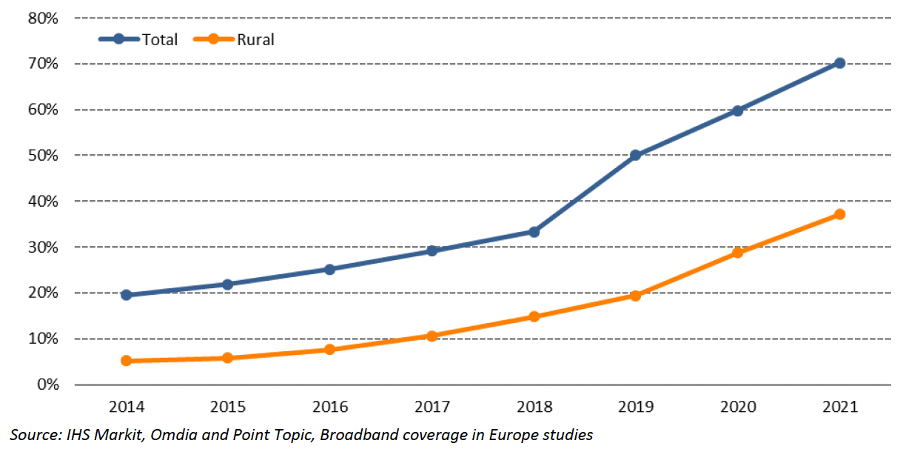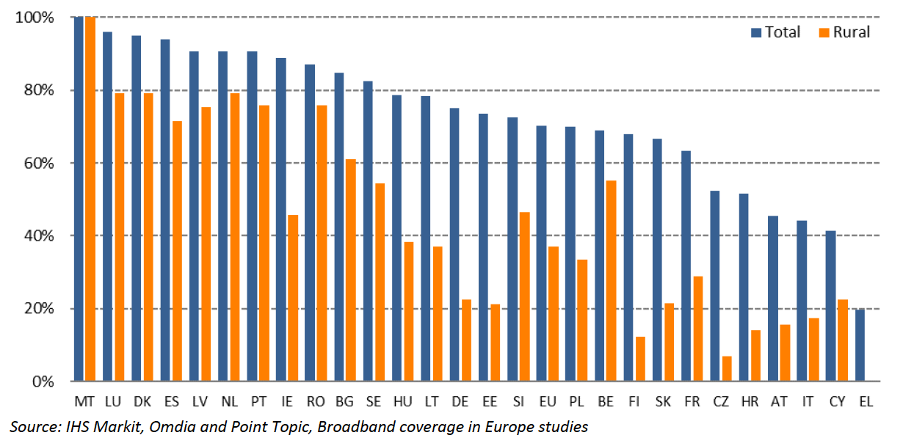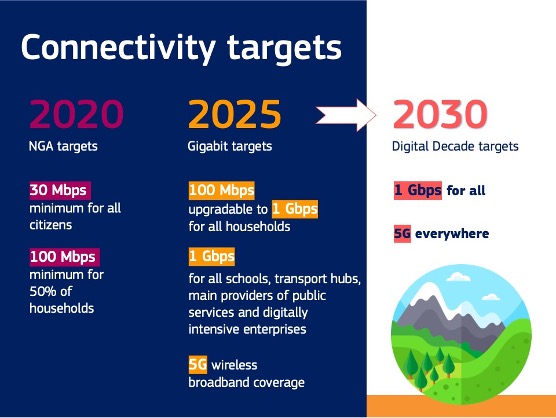
The European Broadband Competence Offices Network Support Facility
This article explores how the EU supports this, particularly through initiatives such as the European Broadband Competence Offices Network, Smart Rural 21 and Smart Villages, as well as with a range of funding instruments and targeted policies.
Europe is facing a set of imminent as well as long-term challenges. The most critical are climate change, democracy, education, economic recession, migration and the energy crisis. To address these within a rural context, community engagement and the modernisation of physical and digital connectivity are essential. These are the prerequisites on which can be built a plethora of initiatives to improve, among others, access to quality information and education, to social and State services, to training, professional development and business opportunities, to mobility and healthcare, and to innovative and sustainable approaches across a multitude of fields.
Such initiatives are not only crucial for the renewal of rural communities, and their long-term vitality and resilience. They also result in far-reaching impact and transformation beyond their communities, for their countries and for Europe as a whole. Based on this, the concept of Smart Villages is an approach that seeks to mobilise sustainable and community-led development through innovative solutions in a holistic manner, by leveraging different types of social, economic and environmental interventions across economic sectors.
"Our rural communities face many pressing problems in the 21st century, from transport, exclusion and reduced services to climate change, depopulation and youth emigration. These problems require smart solutions in areas like education, social inclusion, renewable energy and fast broadband, the development of transport and infrastructure, as well as sustainable agriculture and climate action” - stated Janusz Wojciechowski, EU Commissioner for Agriculture in a video message during the Smart Rural 21 Final Conference, held on 17-18 October 2022 in Sopot-Gdansk, Poland.
Smart Rural 21 is an EU initiative, now entering its second phase as Smart Rural 27, encouraging the development and implementation of Smart Village approaches and strategies in 17 rural communities across Europe in its initial phase (2020-2022). A number of successful initiatives have been implemented as a result, ranging across community engagement spaces and tools, regenerative agriculture, improvement of basic services through digitalisation, smart mobility, smart tourism and youth engagement. Examples showcased during the project’s final conference include:
- Smart Rural Ostana (Italy): residency programme and community place (including co-working space, library, cultural centre)
- Raudanmaa (Finland): smart village hall and multiservice centre
- Mukarov (Czechia): digitalisation of municipal services, waste management, citizens’ participation and youth engagement
- Torup’s (Denmark): Tools and Talent online platform to support and promote sustainable way of sharing tools and resources
- Alsunga (Latvia): development of tourist app, training for citizens to start small businesses and augmented reality app and sensor station by involving young people
- Sentviska Gora (Slovenia): intergenerational centre
- Kythera (Greece): smart farming system and introduction of smart agriculture solutions
For these communities, implementing Smart Village strategies and solutions has had a transformative invigorating effect, improving opportunities and standard of living for the local inhabitants as well as attracting visitors and business to their areas. The learnings of this first phase will form the foundation for Smart Rural 27, along with the Smart Eco-social Villages Pilot Project. Having tested the Smart Villages approach through these initial projects, the new objective is “to prepare Member States and rural communities for the implementation of the Common Agricultural Policy (CAP) post-2020 as well as other EU policies and initiatives, which could potentially support the emergence of additional Smart Villages across the European Union”.
The EU furthermore sees Smart Villages and sustainable rural development as critical twin elements for the realisation of the EU’s Long-Term Vision for Rural Areas (LTVRA) and the Rural Pact. Member States, such as Poland, Finland and Austria, have gone as far as including the Smart Villages concept in their CAP Strategic Plans.
However, as recognised in the LTVRA and as demonstrated through the Smart Rural 21 projects, digital connectivity is the fundamental prerequisite for such solutions – and for achieving a comparable quality of life in rural areas to that in cities. The LTVRA aims for broadband to become a basic service, like water or electricity, as explained by Mario Milouchev, Director for Rural Development within the European Commission’s Directorate-General for Agriculture and Rural Development, in a video interview with the BCO Network.
Rural broadband coverage of sufficient quality for modern usage remains a stumbling block for many of Europe’s rural areas. As shown in the graph below, more than 60% of rural households remain unserved by Very High-Capacity Networks (VHCN), according to the 2022 Digital Economy and Society Index Report (DESI). This is more than double the proportion unserved in urban areas.
Figure 1 – On average: fixed VHCN coverage in the EU (% of households), 2014 – 2021 (Source: DESI 2022 report)

Figure 2 – By country: fixed VHCN coverage in the EU (% of households), mid-2021 (Source: DESI 2022 report)

In order to bridge this digital divide, which leaves rural citizens at an increasingly severe disadvantage, the EU has set ambitious broadband connectivity targets:
- By 2030: 1 Gbps for all and 5G coverage in all populated areas
- By 2025: 100 Mbps upgradable to 1 Gbps for all households, and 1 Gbps for all schools, transport hubs, main providers of public services and digitally intensive enterprises

The greatest challenge to closing the digital gap in rural areas is market failure: the most under-served communities are the most expensive to connect and do not offer a sufficient business case to justify intervention by the private sector.
As such, the EU and Member States have foreseen a range of measures, funding and support to promote broadband projects at national, regional and local levels.
EU funding for broadband
To support broadband public and private broadband investment, the EU has made the following financial tools available:
- Recovery and Resilience Facility
- European Regional Development Fund
- European Agricultural Fund for Rural Development
- Just Transition Fund
- Connecting Europe Facility - Digital
- Connecting Europe Broadband Fund
- InvestEU Fund
The European Broadband Competence Offices Network
The European Broadband Competence Offices Network (BCO Network) is an EU initiative bringing together Member States’ national and regional public authorities in charge of broadband deployment to exchange knowledge and good practices with peers, experts and European Commission representatives, with the objective of building in-country capacity to bring reliable, high-speed broadband connectivity to all EU citizens.
As such, the BCO Network also works to share information about broadband funding and replicable good practices to potential broadband project promoters, with a particular emphasis on rural and remote communities, where replicating successful locally-led initiatives will play a very important role in bringing the necessary connectivity to their inhabitants and businesses. Such examples are shared through the BCO Network video playlist and publications, such as the Rural Broadband Handbook, and through the European Broadband Awards and the Rural Inspiration Awards.
